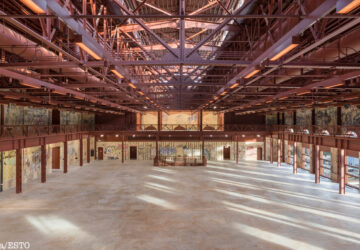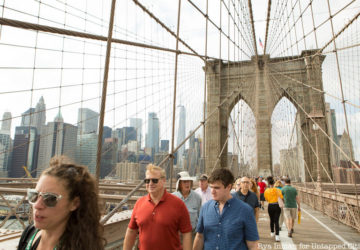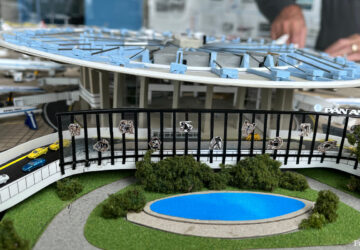“[It used to be] you would come into a newsroom and somebody was always there…this is the first class where there [is] not a reporter in the newsroom. Everybody went home. Come on in.”
Tired students file into the vacant bullpen in USA Today’s Los Angeles headquarters, following the man with a commanding voice.
Our huddled group is awkwardly large for the narrow aisles, oversized purses and lined notepads jutting and prodding as we shuffle around for space. The room echoes with the hushed murmur that fills museums and churches.
Scott Bowles, film reporter and critic for USA Today, is our guide. He is illuminated by the fluorescent office lights as students lean on cubicle walls and cabinets, holding out their voice recorders. Regardless of being slight, bordering on frail, Scott fills the room with a clear, ringing orator’s voice. His sentences are exact, concise and charismatic. In short, he speaks like a journalist.
“This is called the bull pen, and it’s called a bull pen because they kind of corral us together and that is by intent,” says Scott. With the movie-reel of his words, Scott erects the great newsrooms of the past. Offices are “bull pens” and reporters are “unchained animals,” sniffing out stories and snarling at their bosses.
“I’ve never been in a workplace like a newsroom,” says Scott affectionately. “My father was a newspaper man.” He shares stories, passed on by his father’s colleagues, about how his father paced the halls late into the night, reading through his articles out loud to catch errors. Scott even treats us to a traditional brawl scene, describing how on one occasion, his father assaulted an editor for excising every laborer’s quote from an article regarding a labor dispute.
If the reporters were portrayed as an unchained and wild breed, the copy editors were painted as worn down and ragged. “They work nights, they don’t have much of a social life, they love compliments, they wanted to be writers or to break into the paper and they got shut down,” Scott says. He explains that a knowing reporter will throw a bone, some small recognition or praise, their way. In return, the copy editor might treat the reporter favorably by placing an article “above the fold” of the page, for example.
Scott weaves stories that transport us back to another time, a golden era of journalism, so that we momentarily forget the current reality of the office. In fact, the room in which we stand looks nothing like the world he describes.
The space is humorous, almost clown-like. Dangling in motionless freefall, a small plastic man with a parachute has been pinned to the ceiling. Black bookshelves are filled with cartoon and pop culture figurines in bright, primary colors. Clear jars of individually wrapped candies, piles of change, toy cars, a plastic pair of disembodied red lips and a fake tube of lipstick lie amongst the chaos. Scott makes a smiling reference to the reporters being a fire hazard and I look up, indeed finding a least one fire sprinkler hovering readily over each cubicle.
Without the veneer of sentimentality, the USA Today office is a shadow of the great newsrooms. The bull pen is now more accurately described as a play pen. Downstairs, on the large black directory, the name of this nationwide paper is misspelled as “USA WEKEEND” in thick white letters. It would appear that the days of meticulous attention to detail and fierce pride have passed into history. To speak of journalism in the bull pen, in its meaningful form, is to use the past tense.
Here today at one of the largest papers in the nation, in one of the largest cities of the world, there are no reporters. Looking down at Los Angeles from the tenth floor of this glassy office building on Wilshire Boulevard, I look out at the city and can see only the reflections of the books behind me.
Scott leads us out of the bull pen and back through the narrow corridors. He pauses briefly at a corner and indicates a stream of light, pushing out through one of the doorways. Occasional tapping and quiet shuffling noises drift out into the hallway.
In a hushed voice Scott says, “These are the guys. They work late, they work hard, I don’t know what they do”¦ but they’re always working.” We file silently past the offices and I smile ruefully when I finally understand. This is the office where the bloggers work.
Follow Untapped Cities on Twitter and Facebook. Get in touch with the author @decla1r3.





